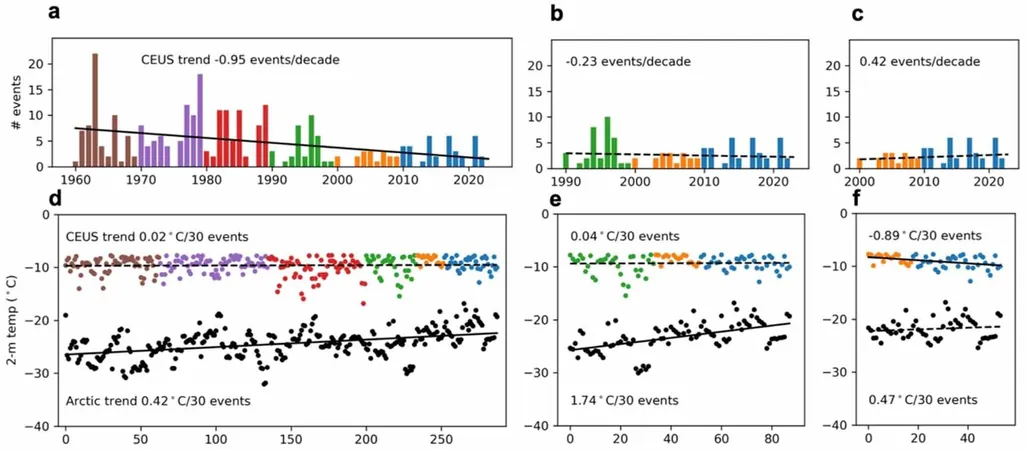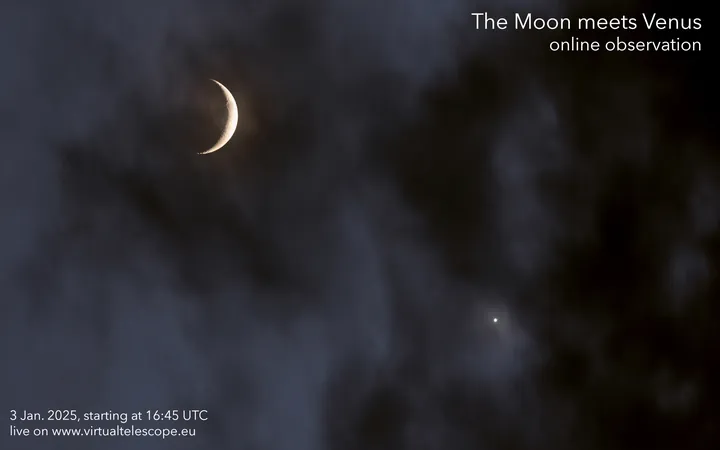
Shocking Link Revealed: Arctic Warming Triggers Severe Cold Spells in the UK and Europe!
2024-12-11
Author: Sarah
Introduction
In an eye-opening study led by climate experts from the University of Lincoln, U.K., researchers have uncovered a startling connection between rapid warming in the Arctic and severe cold spells sweeping across the UK, Europe, and even parts of North America and Asia. This groundbreaking research suggests that while the world experiences abnormal warmth, particularly in the Arctic, we may simultaneously face an increase in extreme cold-weather events in the Northern Hemisphere.
Study Findings
Published in the journal Environmental Research: Climate, the study highlights a phenomenon known as "Arctic amplification," where the Arctic warms several times faster than the global average. This profound warming alters the behavior of the stratospheric polar vortex—a swirling mass of cold air that forms high above the Arctic surface during winter months. When this polar vortex weakens, a situation that has become more frequent in recent years, it disrupts the jet stream, allowing frigid Arctic air to plunge further south than it normally would.
Expert Insights
Lead researcher Edward Hanna, a distinguished Professor of Climate Science and Meteorology, emphasizes the surprising nature of recent cold-weather outbreaks. "Despite ongoing global warming, regions in the Northern Hemisphere, particularly in Eurasia and North America, have continued to see severe cold spells in the last couple of decades. These events have caused significant social and economic disruptions," he explained. This seemingly contradictory trend has puzzled many, as one might naturally expect cold extremes to diminish as climate change progresses.
Research Implications
The research team evaluated various studies, uncovering the complex relationships that contribute to these drastic weather patterns. Their findings not only enhance seasonal predictions and readiness for extreme weather but also broaden our understanding of how climate change impacts our planet.
Further Comments
Dr. Jennifer Francis, a Senior Scientist at the Woodwell Climate Research Center, noted the paradoxical nature of these findings: "Even as the globe warms, we still witness severe cold spells that can last for days, invading areas unaccustomed to such frigid conditions." She highlights the ongoing presence of ice, snow, and cold air in the Arctic, which can drastically shift southward due to sudden warm air surges.
Call to Action
The implications of this research are vast, as the changes in the Arctic affect billions of lives across the Northern Hemisphere. The team urges for more intensive research targeting the interactions between different atmospheric layers, particularly the troposphere and stratosphere. By leveraging modern climate models, scientists hope to unravel further mysteries behind cold air outbreaks under climate change and the atmospheric shifts that lead to these extreme weather events.
Conclusion
To combat these alarming trends, researchers insist on the necessity of swift and bold actions to curb fossil fuel consumption and reduce greenhouse gas emissions. The tools to mitigate these changes exist; it is a matter of rallying the political and public will to act.
As the world grapples with the realities of climate change, this study serves as a sobering reminder of the unexpected ways our environment is shifting—and the urgent need for action to protect communities vulnerable to extreme weather disruptions.






 Brasil (PT)
Brasil (PT)
 Canada (EN)
Canada (EN)
 Chile (ES)
Chile (ES)
 España (ES)
España (ES)
 France (FR)
France (FR)
 Hong Kong (EN)
Hong Kong (EN)
 Italia (IT)
Italia (IT)
 日本 (JA)
日本 (JA)
 Magyarország (HU)
Magyarország (HU)
 Norge (NO)
Norge (NO)
 Polska (PL)
Polska (PL)
 Schweiz (DE)
Schweiz (DE)
 Singapore (EN)
Singapore (EN)
 Sverige (SV)
Sverige (SV)
 Suomi (FI)
Suomi (FI)
 Türkiye (TR)
Türkiye (TR)